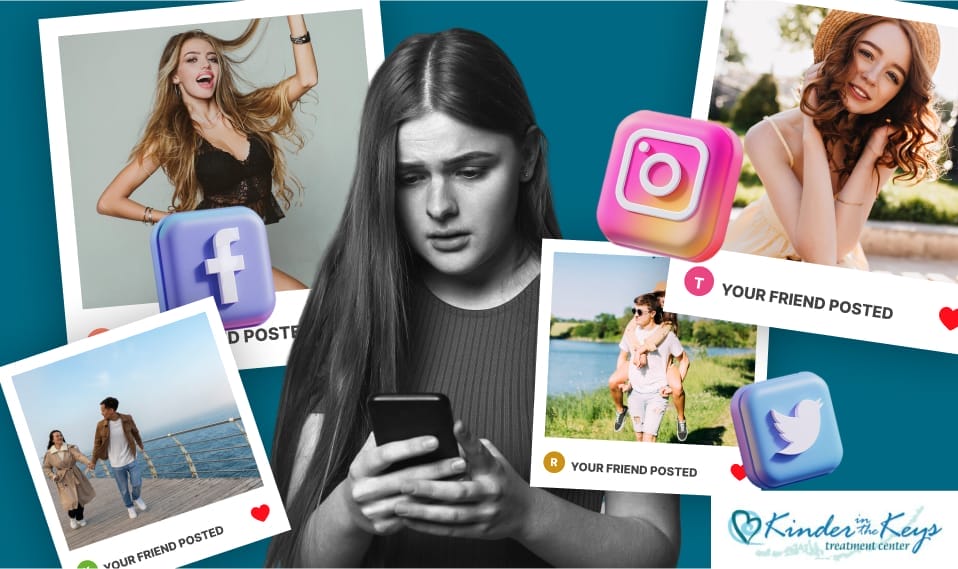The constant stream of idealized images on platforms like Instagram, Facebook, and TikTok sets unrealistic beauty standards that can lead to negative self-perception and unhealthy behaviors. Social media fosters comparison culture, so the role of influencers in shaping body standards and the psychological effects can contribute to eating disorders.
By understanding these dynamics, we can take steps to promote a healthier relationship with social media and support positive body image.

The Role of Social Media Platforms
Social media has become an integral part of our lives, shaping how we perceive ourselves and others. These platforms can contribute to a range of mental health issues and unhealthy behaviors. Being aware of these influences can help you take steps toward a healthy relationship with social media and promote positive body image.
Instagram, Facebook, TikTok, and Other Visually Driven Platforms
Social media platforms like Instagram, Facebook, and TikTok prioritize visuals, often showcasing idealized beauty standards. This emphasis on images can significantly influence how women view their own bodies.
Instagram is known for its beautiful photos and influencer culture, often setting high beauty standards through edited and filtered images. While Facebook has a mix of content, it still promotes ideal body images through shared photos and videos. TikTok, with its short, impactful videos, quickly spreads trends and beauty standards, often highlighting slimmer and more toned body types.
The Prevalence of Edited and Filtered Images
One of the biggest issues with social media is the widespread use of photo editing and filters. These tools allow users to enhance their appearance, often creating unrealistic and unattainable beauty standards.
- Photo Editing Apps: Apps like Facetune and Photoshop let users slim their figures, smooth their skin, and enhance their features, distorting what natural beauty looks like.
- Filters: Social media filters can change facial features and skin tone, further promoting unrealistic standards.

Comparison Culture
Social media encourages a culture of comparison, where users constantly measure their lives and appearances against those of others. This can be especially harmful when individuals compare themselves to influencers and celebrities who present polished, often unrealistic images.
Effects of Comparing Oneself to Influencers and Celebrities
Comparing oneself to influencers and celebrities on social media can have serious effects on mental health and body image.
- Negative Self-Perception: Constant comparison can lead to feelings of inadequacy and dissatisfaction with one’s own body.
- Mental Health Issues: This can result in increased anxiety, depression, and low self-esteem, contributing to a negative body image.
Influencers and Unrealistic Beauty Standards
Influencers play a significant role in shaping modern beauty standards. With their large followings, they have the power to set trends and influence perceptions of beauty. Influencers often dictate what is considered fashionable or attractive, impacting their followers’ views on body image. Many influencers partner with beauty and fitness brands, promoting products that promise to help achieve these idealized standards.
Impact of Promoting Unattainable Body Images
The promotion of unattainable body images by influencers can lead to several negative outcomes for their audience.
Followers may develop unrealistic expectations of their own bodies, striving for an ideal that is not naturally attainable.
In extreme cases, this can lead to disordered eating behaviors as individuals attempt to emulate the bodies they see on social media.

Mitigating the Negative Effects of Social Media
While social media can negatively impact body image, there are effective strategies to counteract these effects. Here’s how you can create a healthier relationship with social media and promote a positive body image.
Promoting Body Positivity
Promoting body positivity is essential in mitigating the negative effects of social media. This involves encouraging acceptance of all body types and challenging traditional beauty standards.
- Body Positivity Movements: Campaigns like #BodyPositivity and #SelfLove advocate for embracing all shapes and sizes, promoting a healthier self-image.
- Positive Influencers: Follow influencers who promote body positivity and realistic beauty standards, providing a more balanced view of beauty.
Media Literacy Education
Educating individuals about media literacy helps them critically analyze the content they consume. This understanding can reduce the pressure to conform to unrealistic standards.
Learning to recognize the use of filters, editing, and other enhancements helps people see beyond the polished images.
Schools and organizations can run campaigns to educate young women about the realities of social media imagery.
Healthy Social Media Practices
I believe adopting healthy social media practices can help mitigate its negative impact on body image. This involves managing screen time and curating a positive feed.
- Limiting Screen Time: Reducing the amount of time spent on social media can lessen its influence on body image.
- Following Body-Positive Accounts: Curate a feed that includes diverse and realistic representations of beauty.
- Creating Supportive Communities: Join or create online communities where members support each other’s journey towards body positivity and mental well-being.
Seeking Professional Help
For those struggling with body image issues and eating disorders, seeking professional help is crucial. Therapists and counselors can provide the necessary support and treatment.
- Importance of Professional Support: Acknowledging the need for help and reaching out to professionals can significantly improve mental health.
- Resources and Treatments Available: Various resources, including therapy, support groups, and medical treatment, are available to support those affected.
Promote Body Positivity and Media Literacy to Reduce Eating Disorders in Women
Addressing the impact of social media on women’s body image requires a multi-faceted approach. Promoting body positivity helps create a more inclusive and accepting view of beauty. Practicing media literacy allows individuals to critically analyze the content they consume, reducing the pressure to conform to unrealistic standards.
Supporting those struggling with eating disorders ensures they receive the professional help and resources needed to recover.
